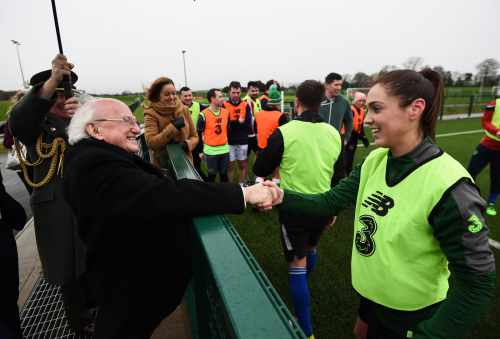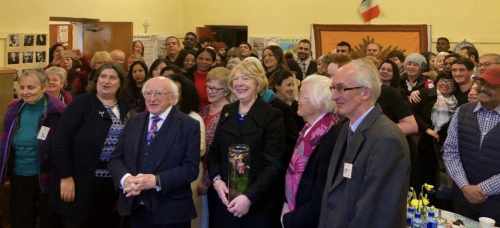Speech at the Annual Dinner of the Cork Chamber of Commerce
City Hall, Cork, Friday, 1st February, 2019
Lord Mayor,
A Thánaiste,
Distinguished guests,
Dear friends,
May I commence by asking you all to be upstanding and to raise your glasses in a toast to the Cork Chamber of Commerce.
I am so pleased to join you all this evening as you mark 200 years of the Cork Chamber of Commerce, and as you commence your bicentenary celebrations.
May I extend my gratitude to your President, Bill O’Connell, for his invitation to join you.
This is my second time to visit Cork this week. Last Tuesday, I was at the Cork Opera House to attend the launch of the RTÉ adaptation of the Atlas of the Irish Revolution, a magnificent volume produced by University College Cork.
For both that occasion and this evening, I took the train from Heuston to Kent Station. It was a reminder that the Dublin-Cork line has always had a superior service – indeed, it was the last train line to maintain the tradition of white tablecloths in the dining car.
I say this as someone who commuted from Galway to Dublin by train throughout my 38 years as a member of the Oireachtas – a very different experience than the Cork line. I never could figure out how the TDs from Cork quite managed to maintain the quality of the service, but finally concluded that even CIÉ must have recognised the quality of the people of Cork, who above all others would appreciate silver service in their dinner car.
More than that, it may be a recognition of the special role that the city and county have played in the history our country.
For 200 years, your chamber has made its own contribution, representing the commercial community of Cork through all the great events that forged our nation, from the rise of Daniel O’Connell in the uncertain decades following the 1798 Rebellion to our War of Independence.
When the subscribers to the new chamber met in 1819, just short of two decades following the Act of Union, they were not only inaugurating a new association, but were opening a chapter in the history of a city and a county. With all of its great outlets to the Atlantic, this city and county of Cork has been at the very heart of the economic history of our country, shaping and shaped by its commerce and contacts with France, Spain and the Americas. The founders of the Chamber were responding to a political event that challenged an existing European trade.
Cork had been among the first regions to experience a distinctive Irish path to modernity, with all its tragedy and all its triumphs. It was the first region to witness the enclosure of land, the introduction of the money economy, and growth of market fairs, and the first to trade and integrate with the new Atlantic economy created by the colonisation of the Americas.
By the dawn of the eighteenth century, the city of Cork was not only a rival to Dublin and Belfast, but was one of the great port cities of the Atlantic, a peer of Bordeaux and Liverpool.
Yet, Cork could not freely compete with Liverpool, Bristol or any other English city. The Atlantic market was jealously protected by the English Parliament, and Cork was prohibited from selling live cattle or from trading directly with the English colonies of the New World.
The economy of Ireland was shaped by laws and regulations made by a representative body in London in which the Irish people – no matter how great their status - had no representation, and upon which they could not exercise any influence. This simple political fact would go on to shape not only our politics, but also our economy.
In response to the restrictions placed on Ireland in the seventeenth century, the merchants of Cork turned towards three new products, the production of salted beef, butter and woollen yarn, commodities which would feed and clothe the French Caribbean and the navies of Europe for generations.
For all its relative success, of course, this model of economic development was not, nor could it ever be, a sustainable one. By the 1820s, sixty percent of households in the county of Cork lived on small plots of land, sustained only by the potato.
Many of those would die or emigrate in the most cataclysmic event in our history, the Great Famine.
The occupations of the men who formed the Cork Chamber of Commerce reflected the unique economy of Cork – they were butter merchants, tallow chandlers, woollen manufacturers and food processors. They were also hungry for political change in the city, for the new chamber was a site of debate and disputation.
The first minutes of the Chamber record that their coffee room at Shinkwin’s – later the Victoria Hotel on Patrick Street – was 'useful to the merchant, instructive to the politician, and amazing to the stranger and light reader'.
The Chamber can be proud that it threw its support behind the Liberator, Daniel O’Connell, and his great causes – Catholic Emancipation, electoral reform, and the campaign for legislative independence. The Chamber attracted men who wished to expand opportunities, not only for trade but for participation in the life of the nation.
This tradition of support for the nationalist ideal was sustained through the Land War, and reached its most potent expression through the election of Charles Stewart Parnell as your President. The rooms in the Victoria Hotel became the venue for more and more meetings of a political nature, as Parnell sought to rally all of Ireland – carefully avoiding divisions of class or religion - behind his campaign for Home Rule.
I have read that it was this election – and the appearance of agitational publications in the coffee rooms – that led to the sharp divisions within the Chamber in the early 1880s. Up to that point the Chamber had survived for over 63 years without a split. It was, of course, Brendan Behan who said that the first item on the agenda of any Irish organisation was the split.
That dictum finally caught up with the Chamber in 1882, and new body, the Cork Incorporated Chamber of Commerce was born. It was a reflection of many of the tensions that naturally arose from the rise of the Home Rule movement, tensions that would only deepen after the fall of Parnell, as the movement itself split asunder.
Last week, we celebrated the centenary of the establishment of Dáil Éireann, an event which united a renewed nationalist and republican movement in Ireland. It was one of the most important moments in our long and unremitting struggle for national independence, the moment in which the modern Irish democracy was born.
The attempted suppression of the Dáil in September 1919 was one of the events that precipitated the intensification of our War of Independence. The burden of that new phase of the War fell, above all, on Cork City.
In March 1920, the Lord Mayor of the city, Tomás Mac Curtain was murdered by agents of the state in his own home. His successor, Terence McSwiney, was arrested while chairing the local Dáil court, and was imprisoned in Brixton Prison. On October 1920, he died after two months of hunger strike. His cause aroused the sympathy of the world, with demonstrations led in his honour by Marcus Garvey in Harlem and Ho Chi Minh in Vietnam.
The statues of Terence McSwiney and Tomás Mac Curtain now stand, quite rightly, outside this building. Yet, perhaps less known is their immediate successor, Barry Egan, who was not only Lord Mayor of the City but President of your Chamber. Only two months after the death of McSwiney, both City Hall and Barry Egan’s business would be set alight by Auxiliaries and Black and Tans, who attempted to set the whole city on fire. This terrible event united both Chambers of Commerce, despite their different perspectives on the national struggle.
The Incorporated Chamber was appalled by the denials and outright lies of the Chief Secretary, the senior British official in Ireland, in the aftermath of the burning and sent a furious telegram to Dublin Castle, stating,
‘The Cork Incorporated Chamber of Commerce and Shipping express their astonishment at the statements made by you in the House of Commons with reference to the destruction in Cork. We demand that, as Chief Secretary, you make personal investigation on the spot of the true facts, when incontrovertible evidence will be placed before you, and that a Judicial Commission of Inquiry be set up without delay.’
1920 was thus not only a year of tragedy and struggle, but marked the beginning of a reconciliation and of efforts to re-amalgamate the Chamber – a recommendation of the Minister of Trade and Commerce in the First Dáil, Ernest Blyth - which finally took place at the end of 1951.
For the first century of our independence, your Chamber has been an important advocate for the economic and industrial development of Cork, from the modernisation of Cork Harbour and the construction of Cork Airport, to the expansion of commercial education and support for new undersea cables.
That has been vital, not only for Cork but for Ireland, for, as a representative of Galway City for over forty years, I know how important vibrant and sustainable regions are for the health of our economy and the prosperity of our people.
We perhaps need to re-discover some of the lessons of regional economy policy that we learned in our own past.
We need realisable long-term plans for our regions and cities, sustained by an active and ambitious state, one confident of intervening where it can to promote and even create economic development, and propelled by the businesses such as those represented here today. We need real regionalism with the capacity to ascertain possibilities and difficulties, establishing policy, make investment choices and be accountable to the people.
That will be all the more important as we confront the uncertainty caused by the decision of the United Kingdom to leave the European Union. Though the outcome of events in Westminster remain in doubt, we can sure that our economic future will only be certain if it rests on a vision of balanced economic development, one conscious of, and capable of rising to, the ecological challenges presented by climate change and the loss of biodiversity both in Ireland and globally.
I am always glad to have an opportunity to visit Cork, be it to acknowledge its musical tradition, the continuing development of UCC in the field of energy or co-operation with Latin America. My visits have included the aftermath of the flooding and I congratulate all those affected on their resilience.
I had sad moments too with the closing of Liam Ruiséal’s bookshop. Loss of bookshops is a cause for grief.
Then too in the world of film we must not forget the founder of the Cork Film Festival, Dermot Breen, or the Jazz Festival. There is much to do in Cork and I am overdue in Turner’s Cross.
On this bicentenary, may I wish you all the very best, not only for your continued prosperity but a healthy, sustainable future for all the people of Cork.


